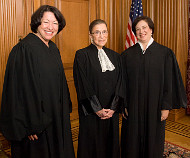4/22/2015
US Supreme Court Limits Drug Dog Use In Traffic StopsA divided US Supreme Court ordered police not to drag out traffic stops to help perform warrantless searches for drugs.

Police may not drag out a traffic stop just to give a drug dog extra time to sniff a vehicle. Tuesday's US Supreme Court decision rolled back lower court precedents that have afforded law enforcement greater flexibility in performing warrantless searches. Here, some of the court's most liberal justices joined with conservatives in tightening the rules.
"We hold that a police stop exceeding the time needed to handle the matter for which the stop was made violates the Constitution's shield against unreasonable seizures," Justice Ruth Bader Ginsburg wrote for the 6 to 3 majority. "A seizure justified only by a police-observed traffic violation, therefore, becomes unlawful if it is prolonged beyond the time reasonably required to complete the mission of issuing a ticket for the violation."
Justice Ginsburg was joined not just by her usual allies, Justices Sonia Sotomayor, Elena Kagan and Stephen Breyer, but also by Chief Justice John Roberts and Justice Antonin Scalia. They agreed that Dennys Rodriguez was held too long at the side of a Nebraska highway when his Mercury Mountaineer was stopped for allegedly swerving around midnight on March 27, 2012.
As Valley Police Officer Morgan Struble questioned Rodgiguez, he developed a hunch that the man was up to something. Officer Struble wrote a warning citation and asked if his drug dog could sniff the vehicle. Rodriguez said "no" about 19 minutes into the stop.
Even though he had received the warning citation, Rodriguez was not free to go. He was made to wait about five minutes for a drug dog to arrive and sniff his car. After a few minutes, the dog detected a bag of methamphetamine. Rodriguez was placed under arrest. The question for the high court was whether this eight minute delay for a drug sniff violated the Fourth Amendment protection against unreasonable searches and seizures.
"The reasonableness of a seizure, however, depends on what the police in fact do," Justice Ginsburg wrote. "The critical question, then, is not whether the dog sniff occurs before or after the officer issues a ticket... but whether conducting the sniff prolongs -- i.e., adds time to -- the stop."
Justices Clarence Thomas, Samuel Alito and Anthony Kennedy objected that this formulation, saying it would lead to arbitrary results.
"The majority's rule thus imposes a one-way ratchet for constitutional protection..." Justice Thomas wrote in his dissent. "Under its reasoning, a traffic stop made by a rookie could be executed in a reasonable manner, whereas the same traffic stop made by a knowledgeable, veteran officer in precisely the same circumstances might not, if in fact his knowledge and experience made him capable of completing the stop faster. We have long rejected interpretations of the Fourth Amendment that would produce such haphazard results, and I see no reason to depart from our consistent practice today."
A copy of the decision is available in a 160k PDF file at the source link below.


